Much Ado: U-M Theatre's "Imogen Says Nothing" bears bizarre and haunting moments
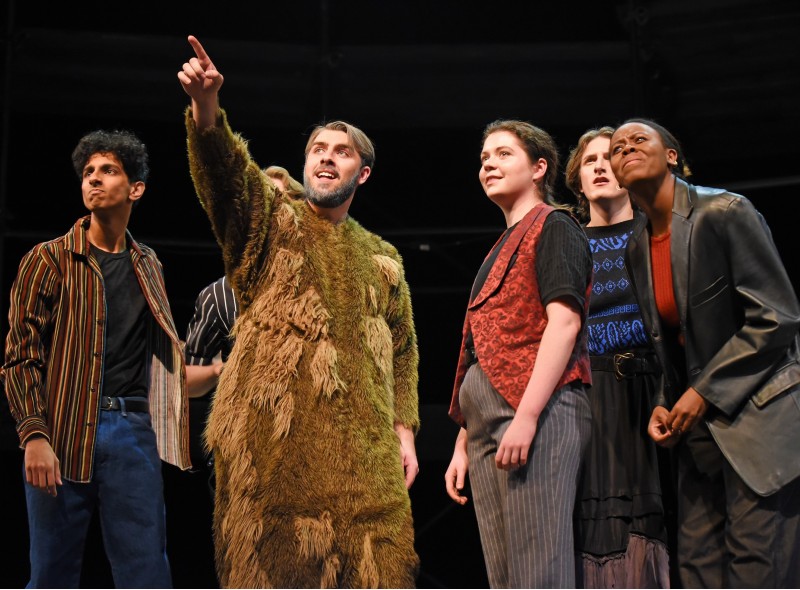
U-M theater professor Malcolm Tulip has long established a reputation for bringing challenging, provocative productions to local stages, going back to his days as a director (and performer) at the sadly defunct Performance Network Theatre.
So it was no surprise to find Tulip at the helm of the U-M theater department’s strange, darkly haunting production of Aditi Brennan Kapil’s Imogen Says Nothing, mounted at the Power Center this past weekend. Inspired by a character, Imogen, who has no lines, but is nonetheless mentioned in the first folio edition of Shakespeare’s Much Ado About Nothing, the play imagines a woman who fights to perform on stage in Shakespeare’s time, when only men played theatrical roles (by law!), and campaigns to appear in the first written version of the play, too.
Plus, there are bears.
Imogen is a former bear (!) who has escaped the bear-baiting arena next to the Globe Theatre, which hearkens back to one of Shakespeare’s most famous stage directions, in The Winter’s Tale: “Exit, pursued by a bear.”
While enmeshed with a troupe of actors, Imogen confronts her former peers, and the line that encapsulates the play, “It is a lonesome thing to be absent,” further expands its meaning.
New Day Rising: Penny Seats' "Sunrise Coven" tackles the opioid epidemic and second chances
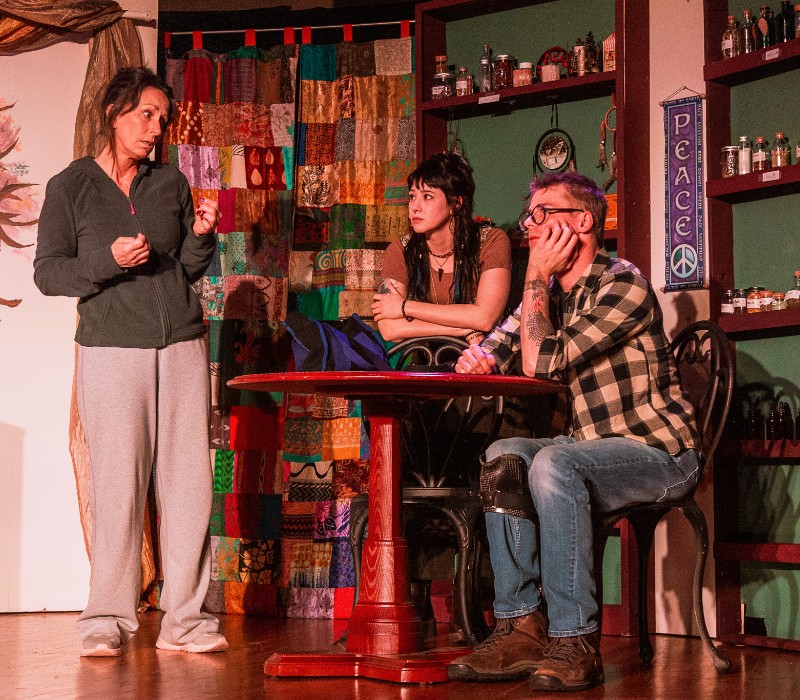
It’s no secret the United States has a drug problem, and painkillers are at the top of the list. The Penny Seats Theatre Company’s Sunrise Coven tackles that conversation and then some.
Written by Brendan Bourque-Sheil, the show takes place in Buckstop, Texas, a small town where everyone knows everyone else and all their business. We meet Hallie Heaton (Jeannine Thompson), a diabetic nurse practitioner who has wound up in the hospital because she overdosed on Oxycodone. The doctor taking care of her is Annie (Inchai Reed), who reveals she has based her entire career on Hallie and sees her as an idol.
Hallie gets the unfortunate news that due to her OD, she has lost her nursing license. On top of that, her eyesight is starting to go bad and she's having visions she can’t explain.
The Folds of Space: EMU’s "A Wrinkle in Time" was a quick-paced journey for the whole family
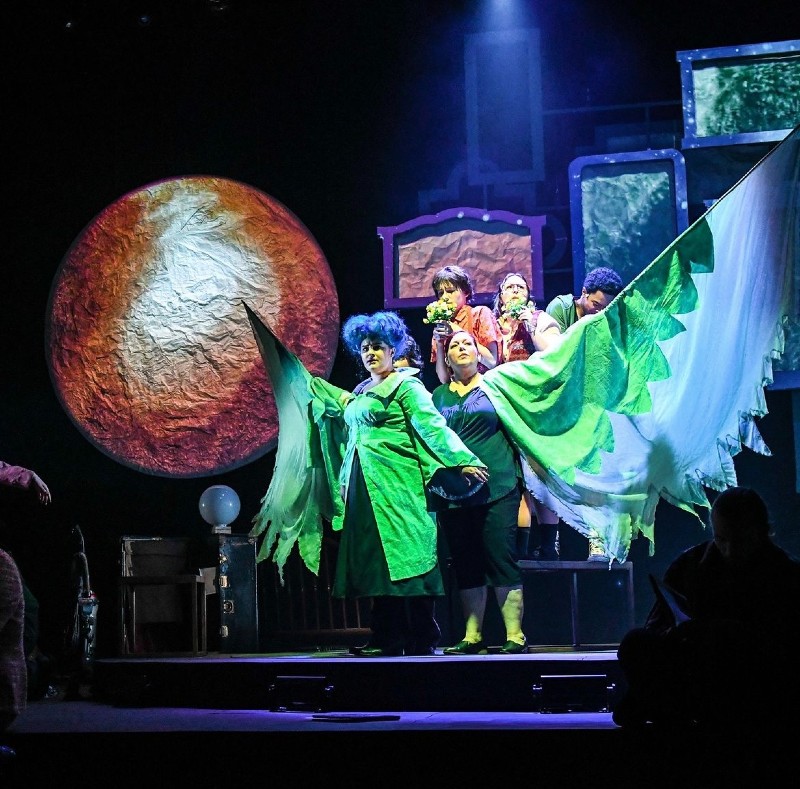
Audiences at Eastern Michigan University’s Liberty Theatre traveled through time and hopped across realms over the weekend.
Tracy Young’s adaptation of A Wrinkle in Time, based on the book by Madeleine L’Engle, was a fast-paced family adventure that follows Meg Murry (Annabelle Rickert), an outcast at school who has trouble fitting in and making friends. The only people she’s close to are her mom (Amanda Bates) and her spunky younger brother, Charles Wallace (Josi Middaugh). Meg’s father (Jonathan Bias) has been missing for quite some time, and she’s still determined to figure out what happened to him.
One day, Charles Wallace convinces Meg they should check out the haunted house at the bottom of the hill. On the way they run into Calvin (Chandler Graham), who joins the siblings. At the house, they meet the eccentric Mrs. Whatsit (Brookelyn Hannah), Mrs. Who (Maura Doyle) who only talks in quotes, and the ominous voice of Mrs. Which (Laney Bass) whose presence is everywhere but isn’t seen by the kids. Turns out they are magical beings that can travel through space and time via a tesseract, a form of traveling by folding the fabric of space and time.
Friday Five: Joe Hertler, Modern Lady Fitness, DFRNC & Alexa Kenny, zagc, BigPlanet
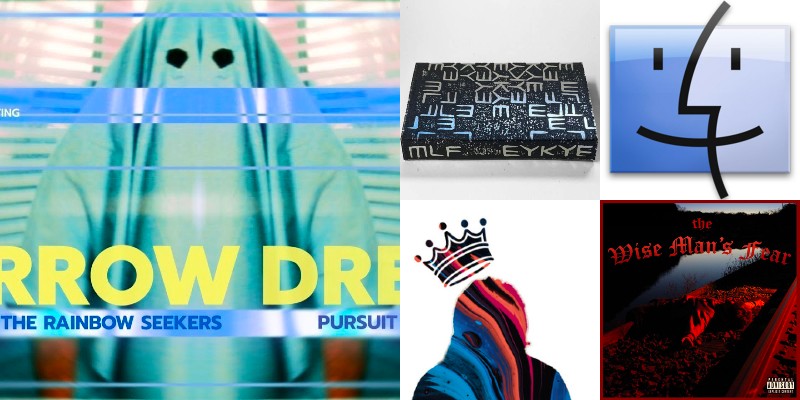
Friday Five highlights music by Washtenaw County-associated artists and labels.
This week features an Ann Arbor-filmed video by pop-rockers Joe Hertler and the Rainbow Seekers, artsy indie by Modern Lady Fitness, hip-hop R&B by DFRNC featuring Alexa Kenny, percussive techno by zagc, and hip-hop by BigPlanet.
Screen Tests: Experimental shorts by Ann Arbor filmmakers
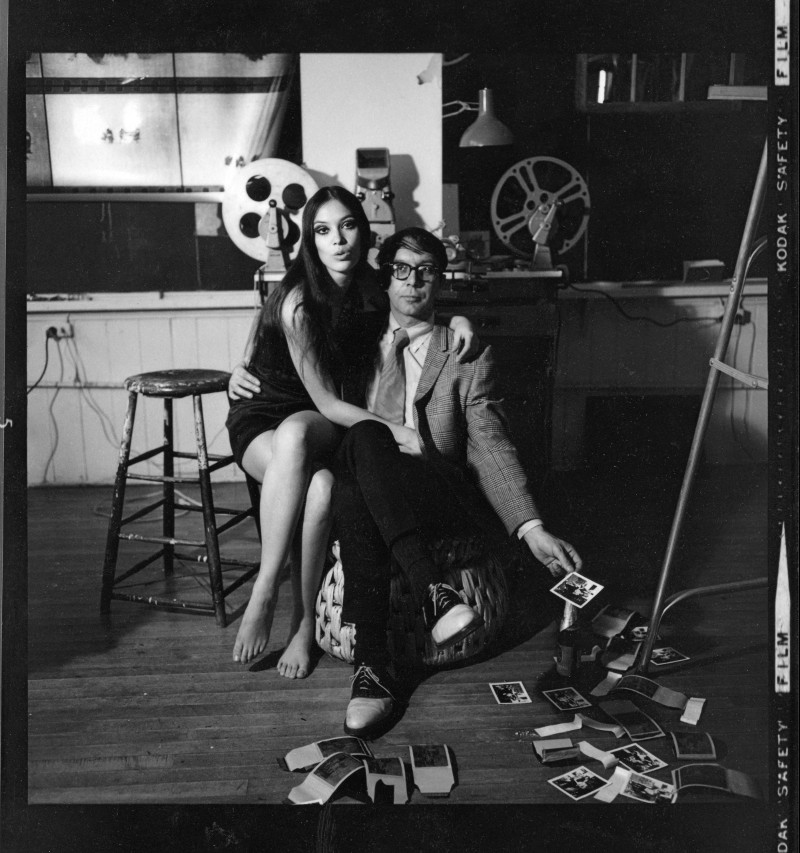
Like all great things, the Ann Arbor Film Festival rose from humble beginnings.
Founded in 1963 by filmmaker and connoisseur George Manupelli, the festival quickly earned an international reputation as a premier venue for independent and experimental cinema. The Michigan Theater has provided the AAFF with a luxurious home since 1980, but the original home base was the University of Michigan’s Architecture Auditorium (now known as Askwith), and the vibes back then were decidedly scruffier.
Local film historian, projectionist, and author Frank Uhle remembers it well.
“In the early days of the Film Festival, audiences were very interactive,” he explained. “There was always a smell of stale beer, cigarettes, and pot smoke in the air. Inevitably some of the films were boring, or pretentious, or deliberately provocative, and people would yell their opinions at the screen or whistle and make noise.
“Sometimes another person would defend the movie and an argument would ensue. Always, a beer bottle would get tipped over in the dark and roll noisily down the sloped floor while everyone snickered.”
That’s the kind of anarchic spirit Uhle will be conjuring on Friday, December 1 at 7 pm when he hosts “Experimental Shorts by Ann Arbor Filmmakers From the 1960s-80s,” a free screening of vintage celluloid at Askwith Auditorium in Lorch Hall. (It's part of U-M's semester-long "Arts and Resistance" series.)
No, he’s not going to let you smoke in there, but he’ll be showing early homegrown AAFF favorites in the same venue they first flickered in back when the counterculture was the culture and the art was the point.
Uhle went to his first AAFF in 1978 and has been involved in local film culture ever since. His recent book, Cinema Ann Arbor, covers the 100-year history of A2’s campus cinema societies and the filmmakers they inspired and nurtured.
Students first officially organized film clubs in 1932 to screen non-mainstream fare, local interest grew along with the AAFF and the university began its film program in 1968. By the 1970s, there were multiple, competing student film societies outdoing each other with screenings of foreign rarities, forgotten Hollywood masterpieces, and uncompromising experiments. It was inevitable that a devoted scene of filmmakers would bloom in such soil, and it’s these artists that Uhle celebrates, a few of whom he’ll have on hand for a Q and A session after the screening.
The films share a loose, improvisational approach but cover a wide range of styles. Handmade animation, abstract imagery, punk lampoonery, cinema verite slices-of-life, introspective moodiness, anti-war agitprop, plus vintage promos and ephemera from film society screenings of the day. Some haven’t been seen for decades, enjoying only a handful of local screenings after production before languishing in various states of storage.
“I got them from a bunch of different sources,” said Uhle. “Mostly from filmmakers, but some of them were literally found in the attic of the Michigan Theater. A lot of the projectionists from U of M would also moonlight at the Michigan, and at a certain point people were stashing these prints up in the attic.”
Others came from faculty members who had purchased and preserved some of the better films that former students had made.
“I’ve had some strokes of good fortune. Alan Young from the film program has this wonderful office that’s like an archive of old equipment," Uhle said. "I noticed up on a shelf there were a few reels of 16mm film. They were student projects that they saved. Some of these films, my god, they were just amazing-looking films.”
Here are a few highlights:
Along the Way: Ypsi singer-songwriter Adam Plomaritas returns with his first new release in a decade

Adam Plomaritas’ new EP reflects on his personal journey of love and growth.
It provides the Ypsilanti pop-soul singer-songwriter with an emotional outlet for exploring the opportunities and challenges that come with being loved and loving others.
“These tunes are about finding a balance between wondering if you’re loved enough and if you’re loving enough in the best ways,” said Plomaritas about Old Time Love, his first collection of new songs since his 2013 album, The Hard Way. “As a husband, father, son, brother, and artist, it’s natural to seek approval, if not always healthy.”
Plomaritas beautifully captures that sentiment on Old Time Love, which features five infectious tracks filled with heartfelt vocals, vibrant horns, and upbeat pop-rock instrumentation.
“The EP is a little bit of introspection, even though the songs are generally light and fun in nature,” he said. “You seemed to have pierced the hard candy shell and gotten to the ooey, gooey chocolate inside—it’s about feeling like you’re enough.”
I recently spoke with Plomaritas about growing up in a musical family, solidifying his writing and recording skills through earlier releases, anticipating his first new release in 10 years, sharing select songs from Old Time Love, and preparing for a December 1 show at The Ark.
Friday Five: Kelly Moran, OVVR, Mirror Monster, Electrifying Audiences, Dre Dav

Friday Five highlights music by Washtenaw County-associated artists and labels.
This week features emotive piano by Kelly Moran, R&B hip-hop by OVR, electronic instrumental pop by Mirror Monster, post-punk synths by Electrifying Audiences, and rap by Dre Dav.
That Old Boom Bap: The Prop Shop's DJ Chill Will has been spinning bangers on WCBN for 35 years

Toward the end of the 2004 smash “Time’s Up” by Jadakiss, a voice came on the radio as a familiar new beat was blended in:
“World-famous Prop Shop. DJ Chill Will in full effect. That’s how it goes down. Saturday nights, 9 to 12 o’clock Eastern Standard Time right here on WCBN-FM Ann Arbor. You can also check us out live on the world wide web at WCBN dot o-r-g and radio dot net backslash WCBN. It’s Saturday night, y’all. We got about an hour and a half left in the show. Sit back and relax, you know we got the classics coming. Prop Shop. Chill Will. Let’s get it.”
I was tuned into 88.3, the University of Michigan radio station, while driving down a darkened stretch of Island Lake Road outside of Dexter. It was a little past 10:30 pm on September 9, and as the DJ concluded his talk-up, I got goosebumps when the bassline thumped.
It was EPMD’s 1988 jam “You’re a Customer,” which has that “Fly Like an Eagle” sample from the Steve Miller Band, but the head-nodding beat is built off a drum sample and bass riff from ZZ Top’s “Cheap Sunglasses”—and it’s deep.
I leaned over and turned up the volume, feeling the vibration rattle my windows. The temp was hovering around 60 degrees, and with nobody else on the road, I opened the sunroof and rolled down the windows so the song could fly from my car and fill the late-summer air.
The Prop Shop has been rattling glass since 1988, and “Chill” Will Higgs has been at the helm for almost the entire time.
It’s also one of the oldest continually running hip-hop radio shows in the world.
The nearly 55-year-old Higgs mostly plays slappers from the late ‘80s through the mid-2010s, with occasional splashes of dancehall reggae—and virtually nothing from the post-trap world of hip-hop and its cymbal-driven songs with light snares. To quote A Tribe Called Quest’s 1993 song “We Can Get Down,” The Prop Shop is all about artists who “with a kick, snare, kicks and high hat / [are] skilled in the trade of that old boom bap.”
For the commercial mixes Higgs sends out to radio clients such as KRYC and KPAT in California and WJZE in Toledo, Ohio, he does play contemporary rap.
But for The Prop Shop, it’s strictly classic hip-hop for the heads from the eras Higgs loves. Other artists I heard that night include Smif-N-Wessun, Run the Jewels, Jay-Z, The Diplomats, Baby Cham, Dr. Dre, Paul Wall, 50 Cent, and Jeru the Damaja.
The true window shakers. The essence of hip-hop. The real boom-bap.
Friday Five: Nadim Azzam, Oren Levin, Fangs & Twang, Erin Zindle, Annabella Paolucci

Friday Five highlights music by Washtenaw County-associated artists and labels.
This week features hip-hop pop by Nadim Azzam, a silly song by Oren Levin, a roots rocker by Fangs and Twang, a ballad by Erin Zindle, and Latin folk-pop by Annabella Paolucci.
"Things Hidden Since the Foundation of the World" Explores the Challenges of Information Overload and Ubiquity

When you Google the name of the Javaad Alipoor Company’s theatrical production Things Hidden Since the Foundation of the World, you learn this grandiose mouthful of a title was originally used by French philosopher René Girard for a book he wrote.
To learn a little more, you might read a brief overview of Girard’s mimetic theory, which posits that humans don’t know what to want, so we look to others and imitate their desires.
Wait. You came here for a review of Alipoor’s show of that name presented by UMS this week at the University of Michigan’s Arthur Miller Theatre, right? Sorry!
Yet this classic Digital Age digression demonstrates precisely what’s at the heart of Alipoor’s innovative 90-minute show, which was written with Chris Thorpe. Though we know, and are constantly reminded, that almost any information we could possibly want is now at our internet-addicted fingertips. In response, we go online like a reflex with the idea that “facts” provide us with understanding, or that the two things are somehow synonymous, is a dangerous illusion.
Using the unsolved, brutal 1992 murder of Iranian pop star (and refugee) Fereydoun Farrokhzad—who fled Iran during the Islamic Revolution in 1979—as the show’s base of operations, Alipoor integrates video and an onstage, fictional true crime podcast (as well as some nifty theatrical sleight of hand) to explore the case, and more broadly, the link between contemporary technology and politics.


































